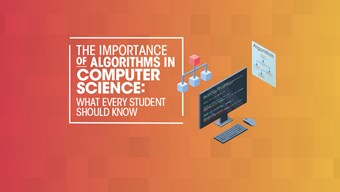There’s no denying the parallels between computer science and IT, however, they cover two vastly different areas of study and can lead to diverse careers. IT tends to focus on the practical uses of computer hardware and software, whereas computer science is primarily focused on the academic application of computers to solve problems.
By Grant Longstaff. Published 11 April 2023.
What’s the difference between a computer science degree and IT degree?
If you choose to study IT the course will cover the design, building, maintenance and management of computer systems and networks. You’ll learn how both hardware and software are used to support our everyday lives, whether personally or professionally, and leave equipped with the knowledge to work in many different fields.
On the other hand, computer science involves studying the theoretical and technical aspects of computing and exploring how technology can help solve complex problems. During a computer science degree, you’ll likely learn about artificial intelligence (AI), cyber security, software engineering, and programming, alongside many other topics.
You may also find some computer science degrees will include optional modules from other subject fields. For instance, our BSc (Hons) Computer Science course offers students the chance to take modules from our BSc (Hons) Psychology degree, so learners can further explore the relationship between human behaviour and technology.
Computer science and IT career options
Because of the practical nature of an IT degree, many graduates who choose to study IT will move into work in areas such as tech support, telecommunications, network administration, or engineering and system analysis. Computer science graduates may find themselves working within the fields of AI, software engineering, business or systems analysis, hardware design, and cyber security.
Of course, this list barely scratches the surface of the careers available, and there will be many roles where you’ll find an overlap between computer science and IT. Our head of computer science, Dr Paul Sant, said in an interview that, “a computing degree doesn’t mean you have to follow a career in tech or become a coder for life. It’s so much more, and the opportunities and career diversity are wide-ranging.”
Computer science vs. IT salaries
It can be difficult to say what course, and subsequently what career, will earn you the most money. There are many factors which can influence and dictate salary, including the industry in which you work, the location of the organisation, and your level of experience. Remember, money isn’t everything. Consider what it is you want to do and what you want to achieve. Is a lesser salary worth the opportunity of working with a start-up you believe in? Think about which industry and which organisation will give you the best opportunity to advance your skills and your career.
Computer science skills vs. IT skills
Not every IT or computer science degree will be the same, so it’s vital you explore what each university offers on its course. What modules do they present? What does their study program cover? It might also be worthwhile researching the faculty. There may be tutors who focus on an area of IT or computer science you find particularly interesting, and so their expertise will be invaluable to your development. Think about your long-term goals and choose the course that suits you.
That said, every course is designed to prepare you for the world of work, so they will equip you with a core set of attributes desirable to many employers. You’ll develop your communication and teamwork skills, and you’ll craft project management skills when working on various assignments throughout your studies. You’ll also enhance your critical thinking and problem-solving abilities. There could also be the opportunity to learn new programming skills, build networks, and design and manage hardware and software systems, depending on the course you choose.
It’s worth remembering technology is a constantly evolving sector. You’ll have to stay up to date with the latest news and developments within the field and you may have to undergo more education and training at various points throughout your career.
Finally, an IT degree doesn’t mean a career in computer science is off limits or vice versa. Computing and technology are everywhere, and as a result the roles and industries in which you might end up working are limitless.
Find out more about our BSc (Hons) Computer Science degree and register your interest today. Alternatively, if you’re already a graduate and thinking of a career change, explore our MSc Computer Science (Conversion) course and start your tech journey today.



